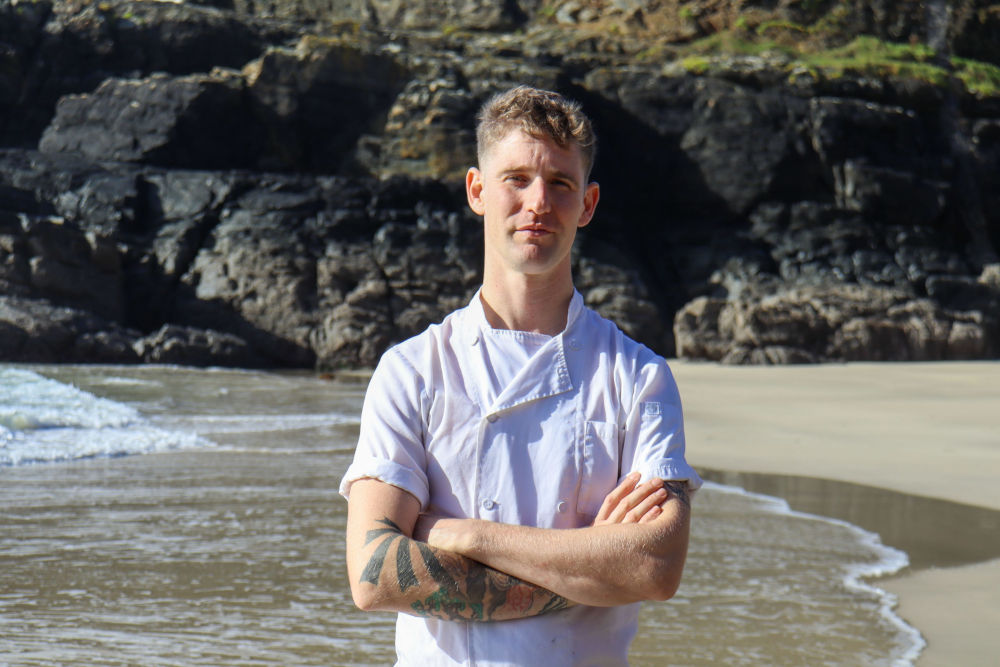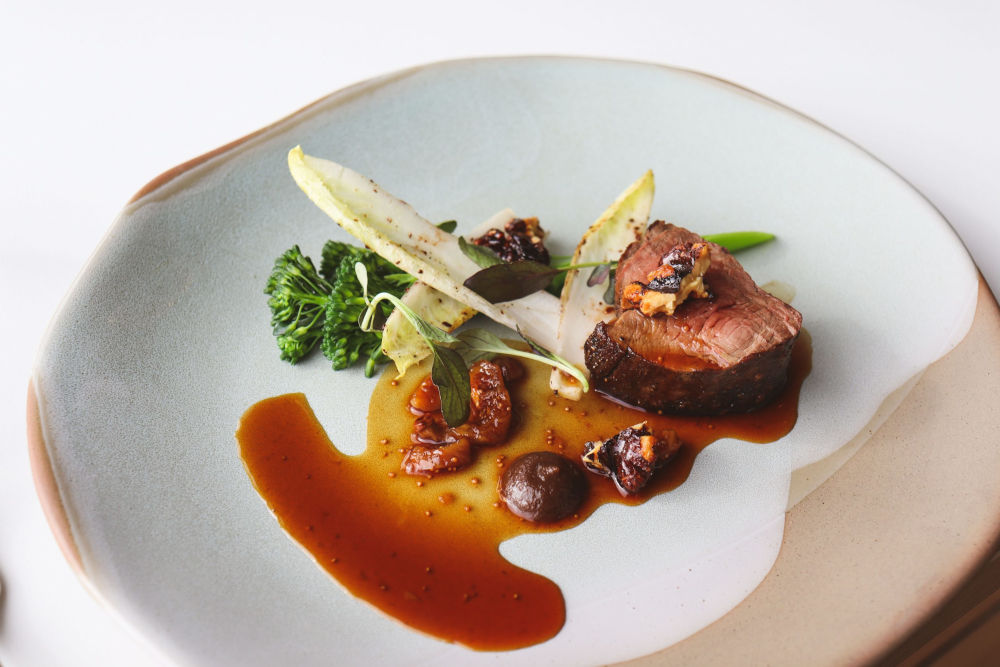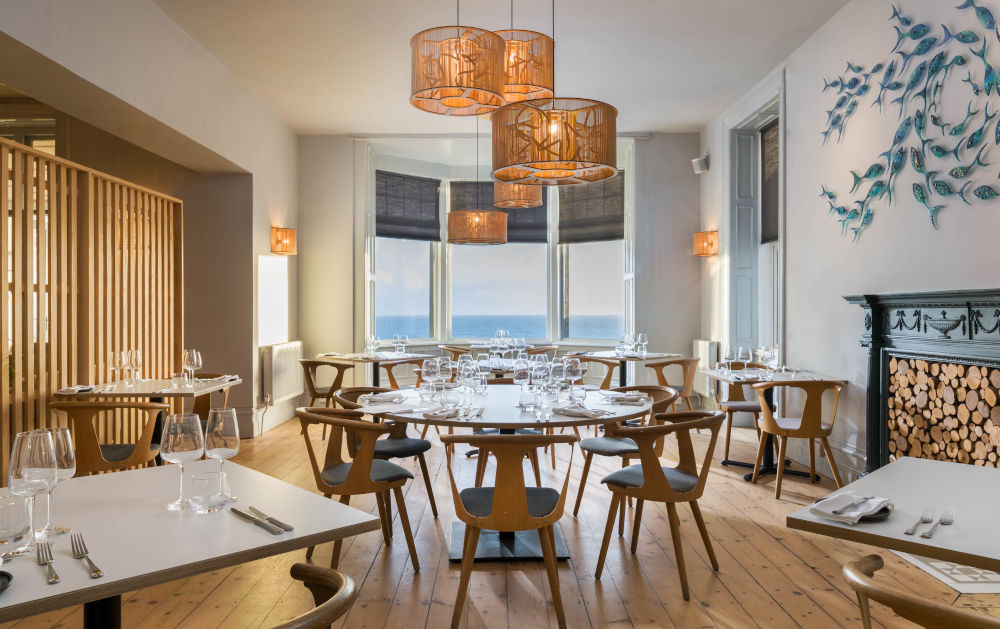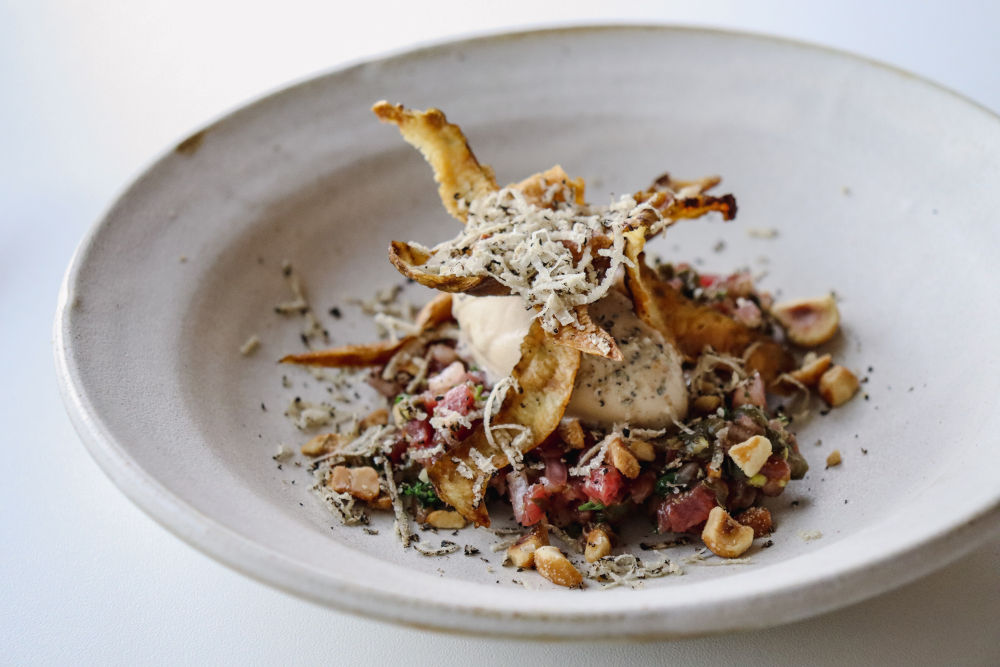Joseph Fallowfield is the head chef at Fallowfields, a fine dining restaurant sitting inside Housel Bay hotel and overlooking the stunning south coast of Cornwall at Lizard Point. Focusing on local, seasonal ingredients, prepared and presented with finesse, the restaurant offers delectable tasting menus with stunning seaside views in a glorious setting.
We caught up with the chef to hear all about his career and plans for the future, and how the natural Cornish larder provides the perfect ingredients for his culinary creations.
Can you tell us a little bit about yourself, including where you are today, professionally, and what got you here?
I adore being a chef but to insinuate that it has always been my ambition would be untrue. I was pulled into this career because of the tight-knit kitchen culture. There is something about dealing with immense stress and pressure which pushes people together. The outcome is somewhat of an eccentric family unit. Throw in some fire, explosive personalities and flavours that I had never experienced, I was hooked.

What, or who, inspired you to become a chef?
Initially it was the culture that attracted me, however, as I progressed, quality and professionalism became important to me. I had the opportunity to work for an ex-Michelin starred chef, Stuart Eddy, in his restaurant in Cornwall. Until this I had learnt in a very unstructured manner, there were huge gaps in my knowledge and an ego which didn’t like to admit it. Stuart was very strict and with a couple of stern conversations ‘ironed’ this out of me pretty promptly. Once you have that basic level/foundation I think you can then build from there.
Who has been your biggest influence to get you to where you are today?
As a young chef I had been conditioned to fear the word ‘Michelin’. I had been told that it was unrealistic to expect to ever work in a restaurant that achieved the accolade and because of this I had never considered being capable of working to that level.
However I worked for a chef in France called Alan White (Scottish ironically) who explained the concept of stagieres. This literally opened my eyes to a world couldn’t have ever conceived. I stepped into some of the most prestigious kitchens in the UK armed with a notepad and my eyes wide open. It is incredible what you can learn in a week, in terms of quality, professionalisms and discipline.
What’s your signature dish?
We try to represent the area in which we are based and the season, because of this our dishes are changing constantly. However, in the summer, we do a phenomenal dish with a sauce made from lobster bones, we serve with stonking fresh cod loin, a huge scallop, plump mussels, and a really rich crab tortellini. One of Cornwall’s greatest strengths is the quality of the seafood and this dish is an incredible example of it.

What are the most important considerations when crafting your menu?
We craft our menus completely around the seasons in the UK. We choose to utilise products from as close to the restaurant as possible, this means swapping exotic fruit for buckthorn berries and being substantially more flexible with our produce and suppliers. Our ordering system is more of a conversation as opposed to a traditional order.
Do your personal preferences influence the menu at all?
Our menus are completely influenced by my personal preferences. I spent a large proportion of my career cooking to other people’s tastes, desperately trying to work out what ‘excellent’ was and struggling in such a subjective context. When I became a head chef it was daunting but also a huge relief to start cooking to my own standards. It becomes a far more honest process if you cook food to your own standards. Thankfully, so far, it has been well received!
How would you describe your cooking style?
My cooking style is a somewhat bastardised product of the chefs I have worked for. Certainly British with a mix of traditional and modern methods. I love punchy Asian flavours, so they are quite notable throughout the menu. Everywhere I have worked has focused on quality of produce, however, and I think this is by far the most important factor.

Do you have a favourite time of year or set of ingredients that you look forward to working with?
I have always adored root vegetables and after having a drought of these through summer makes the winter season even more special. Furthermore, ingredients almost start to demand a touch of booze, which I’m all about. Slow cooked beef shoulders in ale, lamb shanks in red wine and cherries preserved in brandy from summer. Huge, bold flavours that warm the soul!
What would you be doing if you weren’t a chef?
I find myself battling with this question on a regular basis. Whether to escape the stress, pressure and unsociable working hours or to embrace it? I actually applied once to become a trainee tax inspector which, I thank the heavens, I backed out of. I would get bored, hungry and unenthused with a job like this. Realistically I need the pressure and teamwork in my life. If I had to leave hospitality then I would go into health. I’m well rehearsed at long hours, stress and soft management, which I think could be a great fit for the NHS.
When are you happiest?
I have the world’s most incredible family who I cherish. Its not easy to balance my work with life but my family has always come first. I think it’s great that the industry is changing and realising how important it is to have a life outside of the workplace. I love my job but also time off!

What differences do you find working with local produce as opposed to non-local produce in terms of what you can create and flavour?
We have developed a selection of suppliers based on trust and quality. This means that we all have to be more flexible in our approach to the produce we buy. Our ordering system revolves around conversations as opposed to traditional demands each night after service. Our suppliers understand what we want and for what price which means that we can avoid supply vs demand issues that others are penalised for and, ultimately, offer better value.
Where is your favourite place to dine?
I have a six-year-old so eating out is generally a casual affair. In Cornwall there is an incredible café in the countryside called Slice which is really very unique, fresh and brilliant quality. However, I spend a week each year in London eating out and there is a restaurant run by a chef I had the pleasure to work with previously. It’s called the Waterhouse Project, the food is everything you want, unexpected, punchy and simply delicious.
What do your future plans entail?
The future for Cornwall is certainly looking bright, I have no interest in moving so I would love to establish myself here more professionally. I would always like to improve the quality of our dishes here, I think that is something which will happen forever. There is no target just a willingness to improve further.
Outside of the kitchen I am studying for a masters in Strategic leadership and management in November. Running a kitchen is fundamentally leading a team and great management is becoming increasingly integral to the success of this.
Factbox
Address: Housel Bay, Lizard, Helston, TR12 7PG
Tel: 01326 567500
Website: Fallowfields Restaurant
Instagram: instagram.com/josephfallowfield
Read more about Housel Bay hotel here.
Imagery supplied by Housel Bay hotel.






















